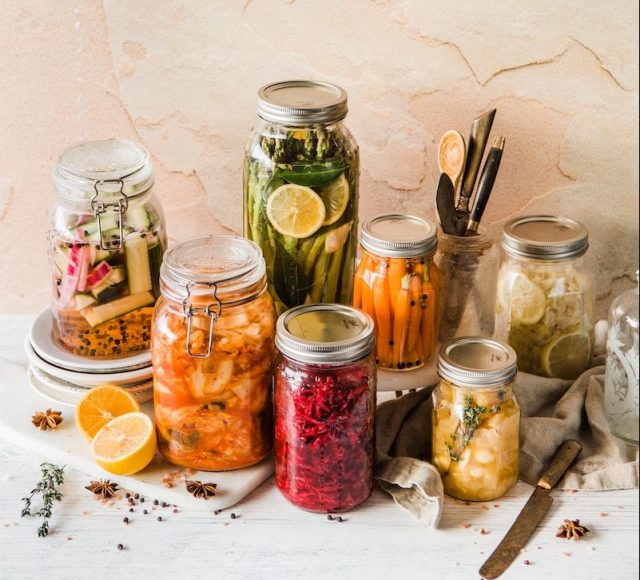Introduction

Greetings! Are you familiar with fermented foods? They are not only delicious but also highly beneficial for your well-being. Fermentation has been utilized for a considerable time as a preservation and flavor enhancement technique for various food items. Interestingly, they also possess incredible health advantages. This article delves into fermented foods, their origins, and easy ways to incorporate them into your diet. If you want to explore new foods or enhance your health, read on!
Definition of fermented foods
Alright, before we get too deep into it, let’s start with the basics: What the heck are fermented foods anyway? Basically, fermentation happens when tiny organisms like bacteria or yeast change sugars or carbs into organic acids or alcohol. This process not only changes the taste and texture of the food but also makes it way better for you. Fermented foods come in all kinds of flavors, from tangy sauerkraut to rich and complex miso, each with its own unique taste and nutritional benefits.
A brief history of Fermentation
Fermentation has been around for thousands of years. Back in the day, people used it to preserve perishable items without refrigeration. It played a huge role in shaping and sustaining cultures worldwide! For example, fermented soybeans in China gave us soy sauce and miso, while cabbage fermentation in Europe led to the creation of sauerkraut. And have you tried fermented yogurt or labneh from the Middle East? Or kimchi from Korea? So many delicious options to explore!
But here’s the best part: fermented foods aren’t just tasty. They’re also super healthy! Studies have shown they’re great for digestion, gut health, nutrient absorption, and boosting immunity. So whether you’re a foodie or just looking for a healthier diet, adding fermented foods to your meals could be a total game-changer. And trust us; there are so many creative ways to incorporate them into your daily routine. Ready to embark on a flavorful journey that’ll nourish your body from the inside out? Let’s do this!
Health Benefits of Fermented Foods
Fermented foods offer a wide array of health benefits that make them a valuable addition to any diet. Let’s explore some of the key advantages that come with incorporating fermented foods into your meals:
- Improved Digestion and Gut Health: Did you know that eating fermented foods can do wonders for your digestion and gut health? These foods are loaded with helpful bacteria, also known as probiotics, that can really boost your gut microbiome. And when your gut is happy, your body is happy! Probiotics can help break down and digest your food more efficiently, which means you’re getting more nutrients out of your meals. Plus, a healthy gut microbiome can lead to less bloating, better digestion overall, and even a better mood. So next time you’re at the grocery store, maybe consider picking up some sauerkraut or kimchi!
- Boosted Immune System: Did you know that your gut plays a big role in your immune system? It’s true! Eating fermented foods can actually help support your immunity. Fermented foods help activate immune cells in your gut, which can boost your immune system. Plus, the probiotics in fermented foods help your body produce antibodies and other substances that fight off diseases and infections.
- Increased Nutrient Absorption: Fermentation can actually help your body absorb more nutrients from the foods you eat. Like, did you know that yogurt and kefir are way better for you when they’re fermented? They can give you more B vitamins and calcium than the non-fermented stuff. And if you’re into veggies, fermented ones like sauerkraut and kimchi can give you more vitamins C and K and minerals like iron and magnesium. So, to get the most out of your food, think about adding some fermented stuff to your diet. It’s a pretty easy way to help your body get the nutrients it needs.
- Lowered Risk for Diseases: Those good bacteria found in fermented foods help keep your gut healthy and balanced, which has been linked with a decreased risk of conditions like obesity, type 2 diabetes, and heart disease. Plus, fermented foods are chock-full of bioactive compounds, like antioxidants and phytochemicals, that have anti-inflammatory and anti-carcinogenic properties, which can lower your risk of chronic diseases, including some types of cancer. So, next time you think about what to eat, maybe consider adding some fermented foods!
As you can see, the health benefits of fermented foods extend far beyond their delicious flavors. By incorporating these probiotic-rich delights into your diet, you can experience improved digestion, enhanced immune function, better nutrient absorption, and a lowered risk for various diseases. So, why not embark on a culinary adventure and explore the diverse range of fermented foods available? Your taste buds and your body will thank you for it!
Types of Fermented Foods to Include in Your Diet

When it comes to incorporating fermented foods into your diet, the options are plentiful. From tangy vegetables to bubbly beverages and creamy dairy delights, there’s something to suit every palate. Here are some popular types of fermented foods that you can easily include in your daily meals:
- Sauerkraut and Kimchi: They’re both fermented veggie dishes that are totally delicious! Sauerkraut’s a classic in Eastern Europe – it’s made by fermenting shredded cabbage with salt until it gets tangy and slightly sour. It’s great as a side dish with all kinds of savory meals. Kimchi’s a Korean fave, and it’s usually made with cabbage, radishes, chili flakes, garlic, and ginger. It’s got a little kick to it, and it’s also packed with good stuff like healthy bacteria, vitamins, and fiber. So basically, both sauerkraut and kimchi are great for your gut health and taste amazing too!
- Kombucha and kefir: If you’re looking for a tasty and healthy drink, you should try kombucha or kefir. Kombucha is a type of tea that gets fermented by a blend of bacteria and yeast. It comes in lots of different flavors and has a fizzy and slightly sweet taste. Kefir, on the other hand, is a fermented milk drink that’s made by mixing milk with kefir grains (which is just a combo of bacteria and yeast). It tastes kind of like yogurt and has a creamy texture. Both of these drinks have probiotics that can help your gut health and make your microbiome more diverse. Give ’em a try!
- Yogurt and Cheese: You know what’s delicious? Yogurt! It’s made by adding special bacteria to milk, which makes it all creamy and tangy. Plus, it’s packed with good stuff like probiotics, calcium, and protein. You can eat it plain or mix it up in all sorts of recipes, like smoothies or dressings. And if you’re into cheese, there are tons of different kinds out there with their own unique flavors and textures. Just remember, some cheeses might not be the best choice if you’re lactose intolerant.
These are just a few examples of the diverse world of fermented foods. As you explore the options, you’ll discover an array of other delicious choices like miso, tempeh, sourdough bread, pickles, and more. Remember to read labels and opt for naturally fermented versions that don’t contain additives or excessive amounts of sugar. By incorporating various fermented foods into your diet, you can enjoy the unique flavors while reaping the numerous health benefits they offer.
Tips for Incorporating Fermented Foods into Your Diet
Incorporating fermented foods into your diet doesn’t have to be overwhelming. Here are some helpful tips to help you get started and make the most of these nutritious delights:
- Start small: If you’re new to fermented foods, it’s a good idea to take it slow and try one type at a time. That way, your body can get used to it, and you can figure out what you like. Start with a small portion and see how you feel. If all goes well, you can work your way up and try other fermented foods too!
- Use fermented foods as toppings or condiments: A simple way to introduce fermented foods into your meals is by using them as toppings or condiments. Just add a scoop of sauerkraut or kimchi to your favorite salads, sandwiches, or wraps for some extra flavor and probiotic goodness. Or, you can sprinkle fermented veggies on top of your grain bowls, stir them into soups and stews, or serve them up as a tasty side dish. Easy peasy!
- Experiment with different recipes: Trying out different foods is always a fun adventure, especially when it comes to fermented foods! There are so many recipes out there that use fermented ingredients, and it’s exciting to experiment with new flavors and textures. For example, you could make a yummy salad dressing using kefir or yogurt or add miso paste to your stir-fries and soups for an extra kick of flavor. Don’t be afraid to get creative in the kitchen – the possibilities are endless!
- Pair fermented foods with complementary ingredients: To enhance the flavors and make fermented foods more enjoyable, pair them with complementary ingredients. For example, you could throw some fresh fruit or nuts into your yogurt or mix some herbs and citrus with your kombucha to make a yummy mocktail. Adding some extra flavor and nutrition can really make your meals more satisfying and tasty. Give it a try and see what you think!
- Explore cultural cuisines: Many traditional cuisines have a rich history of incorporating fermented foods. Exploring different cultural cuisines can introduce you to a variety of fermented delicacies. Try Korean dishes like bibimbap with a side of kimchi, or explore Middle Eastern cuisine by enjoying labneh alongside falafel and pita bread. Embracing cultural foods can open up a whole new world of flavors and expand your fermented food repertoire.
Remember, it’s essential to choose high-quality, naturally fermented foods to ensure you’re getting the full benefits. If you’re unsure about a specific brand or product, check the ingredients list and look for those without added sugars or unnecessary additives.
Conclusion
To sum it up, fermented foods provide an abundance of benefits for our overall health and well-being. Not only do they improve digestion and gut health, but they also boost the immune system, enhance nutrient absorption, and lower the risk of diseases. The probiotics found in fermented foods support our digestive system and improve nutrient utilization, promoting a healthy gut microbiome. Furthermore, the bioactive compounds present in fermented foods possess anti-inflammatory and antioxidant properties that can reduce the risk of chronic diseases.
Integrating fermented foods into your diet can be a simple process. Start small by trying one new fermented food at a time, and gradually expand your options. You can also use fermented foods as toppings or condiments to add flavor to your meals. Experiment with different recipes that incorporate fermented ingredients to unleash your culinary creativity.
Whether you prefer tangy sauerkraut or spicy kimchi, refreshing kombucha or creamy kefir, or versatile yogurt and cheese, a wide range of fermented foods suit your taste and dietary preferences. Embrace the diverse world of fermented foods and enjoy their flavors while reaping their numerous health benefits. By incorporating these nutritional powerhouses into your daily meals, you can nourish your body from the inside out and embark on a delicious journey toward improved well-being.
So go ahead, give fermented foods a try, and discover the transformative effects they can have on your diet and overall health. Your taste buds and body will thank you for it!






























